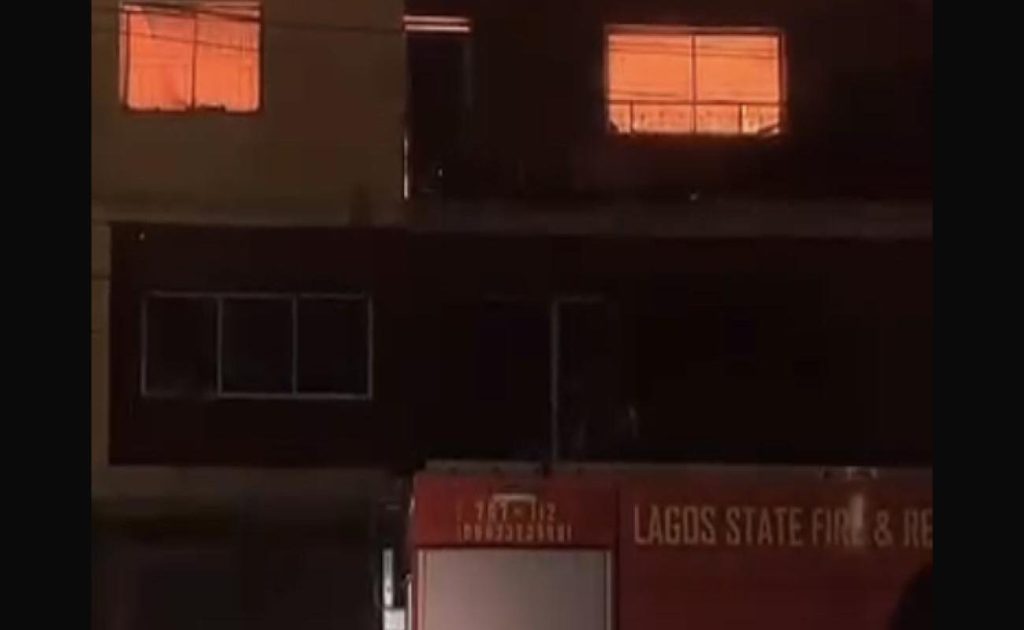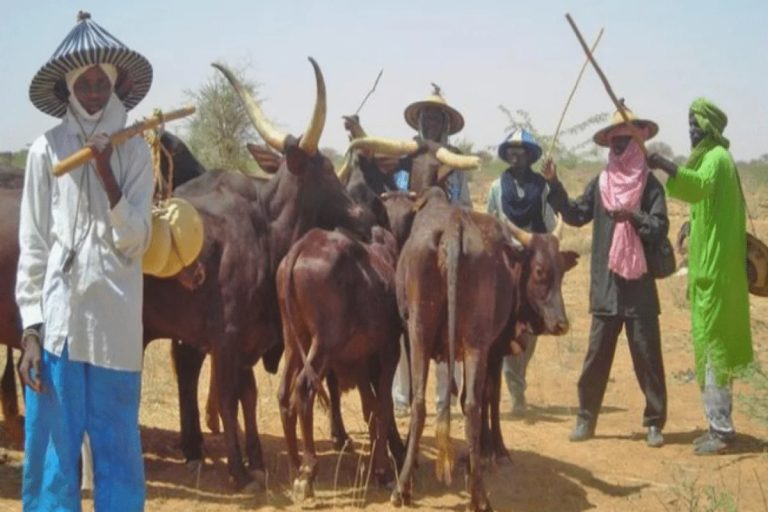
Lagos firefighters battle heavy flames at Alaba Market after a massive late-night inferno. Pic: Social Media
How Did Traders React During Blaze?
Videos circulated on social media, including a live TikTok broadcast by a user identified as KB Clothings, showing frantic traders crying and struggling to salvage goods from burning stores.
One trader could be heard shouting, “Everything I worked for is gone,” as fire swept through an entire row of electrical supply shops.
The Lagos State Fire and Rescue Service confirmed that emergency teams were deployed immediately after distress calls were received from the area.
According to an official statement shared through local media, firefighters from Ojo, Ajegunle, and Alausa stations were mobilized to the scene within minutes of the outbreak.
“Our men are currently on ground working tirelessly to contain the spread and protect adjoining properties,” the statement read.
What Caused the Alaba Market Fire?
As of press time, the cause of the fire had not been determined, but authorities said an investigation would commence once the flames were fully extinguished.
The Alaba International Market, located along the Lagos-Badagry Expressway, is one of West Africa’s largest commercial centers for electronics, home appliances, and building materials.
It attracts thousands of buyers from Nigeria, Ghana, Benin, and other neighboring countries each day.
Fire incidents at Lagos markets have been recurrent in recent years, often resulting in heavy losses for traders and business owners.
In a report by Reuters, Lagos authorities said inadequate safety compliance, illegal wiring, and congested market layouts contribute significantly to frequent outbreaks.
Witnesses at the scene accused market security personnel of responding too slowly, claiming that the fire could have been contained earlier if emergency access routes were not obstructed by goods and makeshift stalls.
“We screamed for help, but nobody came on time,” said a shop owner who identified himself as Mr. Samuel, visibly distraught while watching the remains of his warehouse smoldering.
Another eyewitness told reporters that the fire began from a locked shop before spreading uncontrollably through connecting timber structures.
As panic spread, traders formed human chains to rescue nearby goods, while some used buckets of water in desperate attempts to slow down the advancing flames.
Police officers were seen cordoning off sections of the market to prevent looting and maintain order as crowds gathered in distress.
Several videos also showed rescue workers carrying out gas cylinders from nearby stores to avert potential explosions.
The Lagos State Emergency Management Agency (LASEMA) confirmed that multiple response units were deployed to support the firefighting operation.
“We have our heavy-duty equipment assisting firefighters, and crowd control is ongoing,” an agency official said in a statement published by BBC News.
What Is the Extent of Damage?
Despite intense efforts, traders lamented that the losses could amount to billions of naira, given the high value of goods typically stored within the market’s electronics section.
Some traders reported losing entire consignments imported only weeks ago, raising concerns over insurance coverage and possible government relief measures.
The Lagos State Government has yet to issue an official assessment of the damage, though officials from the Ministry of Physical Planning and Urban Development were seen at the scene late Tuesday night.
Electricity supply to the affected area was cut off to prevent further hazards, according to the Ikeja Electric distribution company.
Markets in Lagos are densely populated commercial hubs, often built without sufficient emergency exits or fire hydrants, making firefighting extremely difficult once an inferno starts.
Experts say recurring fire outbreaks have exposed systemic weaknesses in Nigeria’s market infrastructure.
A 2024 Reuters investigation revealed that 70% of urban markets in Nigeria operate without certified fire extinguishing systems or insurance cover.
Fire officials have long advocated for stricter adherence to building safety codes and emergency preparedness training for traders.
However, enforcement remains weak, and many shop owners reportedly decline to invest in safety infrastructure due to high costs and lack of regulation.
The Alaba Market incident is one of several major fire outbreaks recorded in Lagos this year alone.
Just three weeks earlier, a similar fire destroyed more than 26 shops at Bariga Market, prompting widespread calls for preventive safety reform.
Authorities said efforts are underway to review emergency response protocols and improve coordination between traders’ unions and the state fire service.
“It is important that every market in Lagos has an operational safety committee to respond to emergencies before our arrival,” the Lagos Fire Service stated.
At least five fire trucks and multiple water tankers were deployed overnight to contain the Alaba blaze as firefighters worked tirelessly into the early hours of Wednesday.
By midnight, eyewitnesses said sections of the market were still smoldering, while some traders remained at the scene guarding whatever remained of their goods.
“We cannot leave here tonight,” said one shop owner. “We are afraid people might come and steal from what is left.”
Officials appealed for calm and urged residents to stay away from the affected site to allow rescue teams unhindered access.
Security officers maintained a strong presence around the area as cleanup operations began.
Fire safety experts interviewed by BBC News emphasized the need for Lagos authorities to establish permanent fire sub-stations near major trading centers like Alaba, Balogun, and Ladipo.
Analysts said frequent market fires contribute to Nigeria’s inflationary pressure, as losses in local trade supply chains disrupt consumer pricing and retail stability.
Residents of Ojo, where Alaba is located, reported power outages and heavy traffic as emergency vehicles occupied the main expressway.
Governor Babajide Sanwo-Olu has yet to comment on the incident as of Tuesday night, though the Lagos State Fire and Rescue Service confirmed that an investigation panel will be convened to determine the cause.
For thousands of small-scale traders, the fire represents not only economic devastation but also a loss of years of accumulated business capital.
Many traders rely on cooperative loans and credit facilities to stock their shops, and the destruction threatens their ability to repay outstanding debts.
In an interview with a local station, a trader identified as Blessing Uche described the night as “the worst day of my life.”
“My husband and I just restocked after selling during the holiday,” she said. “Now everything is gone. We are finished.”
Authorities have urged victims to remain patient as post-incident assessments and relief planning commence.
The Nigerian Red Cross confirmed the deployment of emergency volunteers to provide first aid and counseling to victims traumatized by the incident.
Humanitarian agencies said temporary shelters might be provided for traders who lost their means of livelihood, though official confirmation is still pending.
By Wednesday morning, firefighters were conducting final cooling operations as thick smoke continued to rise from charred structures.
Residents nearby were advised to stay indoors due to heavy smoke inhalation risk.
City health officials said medical teams were stationed at nearby hospitals to attend to anyone suffering respiratory distress from the fire.
As daylight broke over Ojo, the magnitude of destruction at Alaba Market became clearer, revealing blackened metal frames, collapsed roofs, and piles of melted electronics.
Several affected traders gathered in groups, discussing how to restart their lives and whether government compensation would ever come.
“We need the government to stand with us,” one trader said in tears. “This market feeds millions.”
The incident reignites discussions about Lagos’ preparedness for urban emergencies and the vulnerability of informal economic hubs across Nigeria.
Related: Police Arrest Suspected Cultist ‘Killer’ With Firearms in Osun State Raid
Analysts say unless long-term safety reforms are implemented, market fires will continue to threaten both lives and livelihoods.
As of publication, firefighting operations had been brought under control, though officials said surveillance teams would remain on site overnight to prevent a recurrence.

